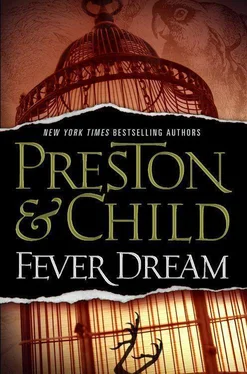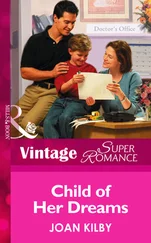Douglas Child - Fever Dream
Здесь есть возможность читать онлайн «Douglas Child - Fever Dream» весь текст электронной книги совершенно бесплатно (целиком полную версию без сокращений). В некоторых случаях можно слушать аудио, скачать через торрент в формате fb2 и присутствует краткое содержание. Жанр: Триллер, на английском языке. Описание произведения, (предисловие) а так же отзывы посетителей доступны на портале библиотеки ЛибКат.
- Название:Fever Dream
- Автор:
- Жанр:
- Год:неизвестен
- ISBN:нет данных
- Рейтинг книги:3 / 5. Голосов: 1
-
Избранное:Добавить в избранное
- Отзывы:
-
Ваша оценка:
- 60
- 1
- 2
- 3
- 4
- 5
Fever Dream: краткое содержание, описание и аннотация
Предлагаем к чтению аннотацию, описание, краткое содержание или предисловие (зависит от того, что написал сам автор книги «Fever Dream»). Если вы не нашли необходимую информацию о книге — напишите в комментариях, мы постараемся отыскать её.
Fever Dream — читать онлайн бесплатно полную книгу (весь текст) целиком
Ниже представлен текст книги, разбитый по страницам. Система сохранения места последней прочитанной страницы, позволяет с удобством читать онлайн бесплатно книгу «Fever Dream», без необходимости каждый раз заново искать на чём Вы остановились. Поставьте закладку, и сможете в любой момент перейти на страницу, на которой закончили чтение.
Интервал:
Закладка:
"But all that still doesn't explain how those parakeets are linked to the Doane family."
"It's quite simple. The Doanes were sickened by the same disease that struck Audubon."
"What makes you say that?"
"There are simply too many similarities, Captain, for anything else to make sense. The sudden flowering of creative brilliance. Followed by mental dissolution. Too many similarities--and Helen knew it. That's why she went to get the bird from them."
"But when she took the bird, the family was still healthy. They didn't have the flu."
"One of the diaries in the Doane house records--in passing--the family coming down with the flu shortly after the bird arrived."
"Oh, my God."
"And then, rather quickly, they manifested signs of creative brilliance." He paused again. "Helen went there to get the bird away from the Doanes--I'm sure of that. To keep it from spreading the disease further, perhaps. And to test it, of course, to confirm her suspicions. Note what Karen Doane wrote in her diary about the day Helen took the bird. She wore leather gloves, and she stuffed the bird and its cage into a garbage bag. Why? Initially, I assumed the bag was simply for concealment. But it was to keep herself and her car from contamination."
"And the leather gloves?"
"Worn no doubt to conceal a pair of medical gloves beneath. Helen was trying to remove a viral vector from the human population. No doubt the bird, cage, and bag were all incinerated--after she'd taken the necessary samples, of course."
"Incinerated?" Hayward repeated.
"Standard procedure. Any samples taken would also have been ultimately incinerated."
"Why? If the Doane family was infected, they could just spread it to others. Burning the bird would be like shutting the barn door after the horse has escaped."
"Not quite. You see, avian flus jump easily from bird to human, but they have great difficulty passing from human to human. The neighbors would be safe. Of course, for the Doane family it was too late." Pendergast took a last sip of coffee, then put the cup aside. "But this still leaves us with a central mystery: where did the Doanes' parrot escape from? And, even more importantly, how did it become a carrier?"
Despite her skepticism, Hayward felt herself intrigued. "Perhaps you're wrong. Maybe the virus lay dormant all this time. The parrot caught it naturally."
"Unlikely. Recall the parrot had been banded. No: the viral genome would have been painstakingly sequenced and rebuilt in a laboratory--using viral material from the stolen Carolina Parakeets. And then live birds were inoculated with it."
"So the bird escaped from a lab."
"Precisely." Pendergast stood up. "The biggest question of all remains: what does this have to do with Helen's murder and the recent killings and attacks on us--if anything?"
"Isn't there another question you're forgetting?" Hayward asked.
Pendergast looked at her.
"You say Helen stole the parrots Audubon studied--the ones that supposedly sickened him. Helen also visited the Doane family and stole their parrot--because, as you also say, she knew it was infected. By inference, Helen is the common thread that binds the two events. So aren't you curious what role she might have had in the sequencing and inoculation?"
Pendergast turned away, but not before a look of pain lanced across his face. Hayward almost regretted asking the question.
A long pause settled over the library. At last, Pendergast turned toward her again. "We must pick up where Vincent and I left off."
" 'We'?"
"You're going to grant Vincent's request, I assume. I need a competent partner. And as I recall, you're from this region originally. You'll do well, I assure you."
His assumptions, his patronizing attitude, were irritating in the extreme. She knew all too well of Pendergast's unorthodox investigative techniques, his breezy neglect for rules and procedures, his skirtings of the law. She would find that annoying, if not intolerable. It might even damage her career. She returned his steady gaze. If it weren't for this man, Vinnie wouldn't be in a hospital right now, critically wounded, in need of a new heart valve.
At the same time... Vinnie had asked her. Twice.
She realized she had already made the decision.
"All right. I'll help you see this thing through. For Vinnie's sake, not yours. But--" She hesitated. "I've got one condition. And it's non-negotiable."
"Of course, Captain."
"When--if--we find the person responsible for your wife's death, you must promise me not to kill him."
Pendergast went very still. "You realize this is the cold-blooded murderer of my wife we're discussing."
"I don't believe in vigilante justice. Too many of your perps end up dead before they even reach a courtroom. This time, we're going to let justice take its course."
There was a pause. "What you are asking--is difficult."
"It's the price of the dance," Hayward said simply.
Pendergast held her gaze for a long moment. And then--almost imperceptibly--he nodded.

48
IN THE DIM GARAGE, A MAN CROUCHED BEHIND a vehicle draped in a white canvas shroud. The time was seven in the evening, and the sun had set. The air smelled of car wax, motor oil, and mold. Sliding a 9mm Beretta semi-automatic pistol out of his belt, the man eased open the magazine, checked again that it was full. After snugging the gun back into his waistband, he opened and closed his hands three times, alternately stretching and clenching the fingers. The target would be arriving at any moment. The sweat crept down the nape of the man's neck and a tendon began to jump in his thigh, but he was unaware of either distraction, so concentrated was he on what was to come.
Frank Hudson had been scouting the grounds of Penumbra Plantation for the past two days, learning the movements and habits of the place. He had been surprised at how lax the security was: a single dotty, half-blind servant opening the house in the morning and shutting it up again at night on a schedule so regular you could set your watch by it. The entrance gates were left closed but unlocked during the day, and they were apparently unwatched. A diligent search had turned up no sign of security cameras, alarm systems, motion sensors, or infrared beams. The decrepit old plantation was so far off the beaten track that Hudson had little to fear from regular police patrols. There were few people at the plantation house besides the target and the servant: only a rather attractive woman with a great figure he'd seen a few times.
Hudson's target, the man named Pendergast, was the only irregularity in the timeless cycle of Penumbra Plantation. He came and went at the most unpredictable hours. But Hudson had observed long enough to see the beginning of a small pattern in his comings and goings, and it centered on wine. When the shuffling old servant began preparing dinner and uncorked a bottle of wine, Pendergast would be home no later than seven thirty in the evening to partake. If the servant did not uncork wine, it meant Pendergast would not be dining at home and would arrive much later in the evening, if at all.
This evening an uncorked bottle of wine stood on the sideboard, clearly visible through the dining room windows.
Hudson checked his watch. He rehearsed in his mind how it would go, what he would do. And then he froze: outside, he heard the sound of wheels crunching on gravel. This was it. Hudson waited, his breathing shallow. The car came to a halt outside the garage, the engine idling. A car door opened, followed by the sound of feet. The garage doors swung open, first one, then the other--they were not automatic--and the footsteps went back to the car. The engine revved slightly. The nose of the Rolls eased into the garage, the lights momentarily filling the space, blinding him. A moment later the lights went out, the engine died, and the garage was dark again.
Читать дальшеИнтервал:
Закладка:
Похожие книги на «Fever Dream»
Представляем Вашему вниманию похожие книги на «Fever Dream» списком для выбора. Мы отобрали схожую по названию и смыслу литературу в надежде предоставить читателям больше вариантов отыскать новые, интересные, ещё непрочитанные произведения.
Обсуждение, отзывы о книге «Fever Dream» и просто собственные мнения читателей. Оставьте ваши комментарии, напишите, что Вы думаете о произведении, его смысле или главных героях. Укажите что конкретно понравилось, а что нет, и почему Вы так считаете.











